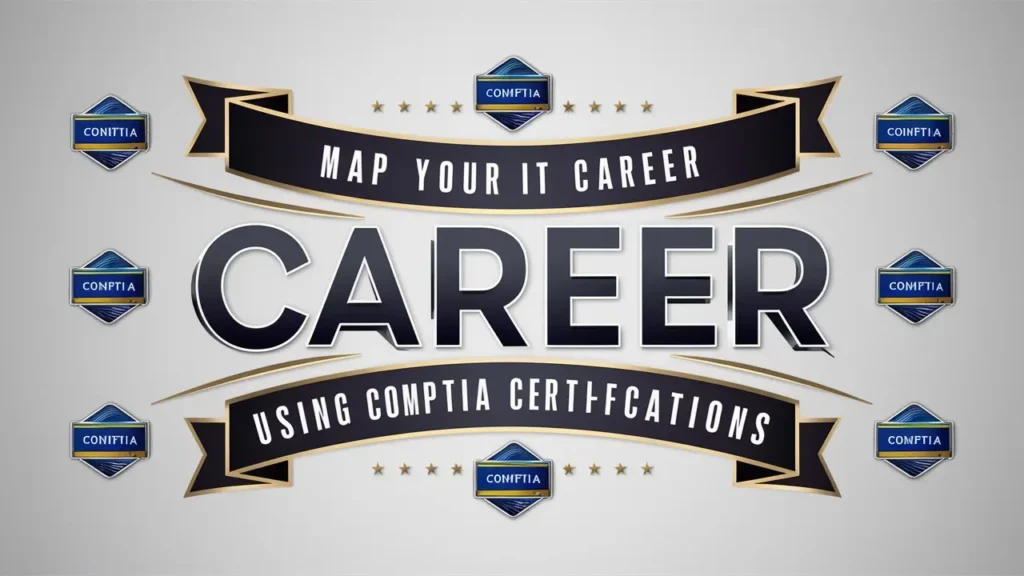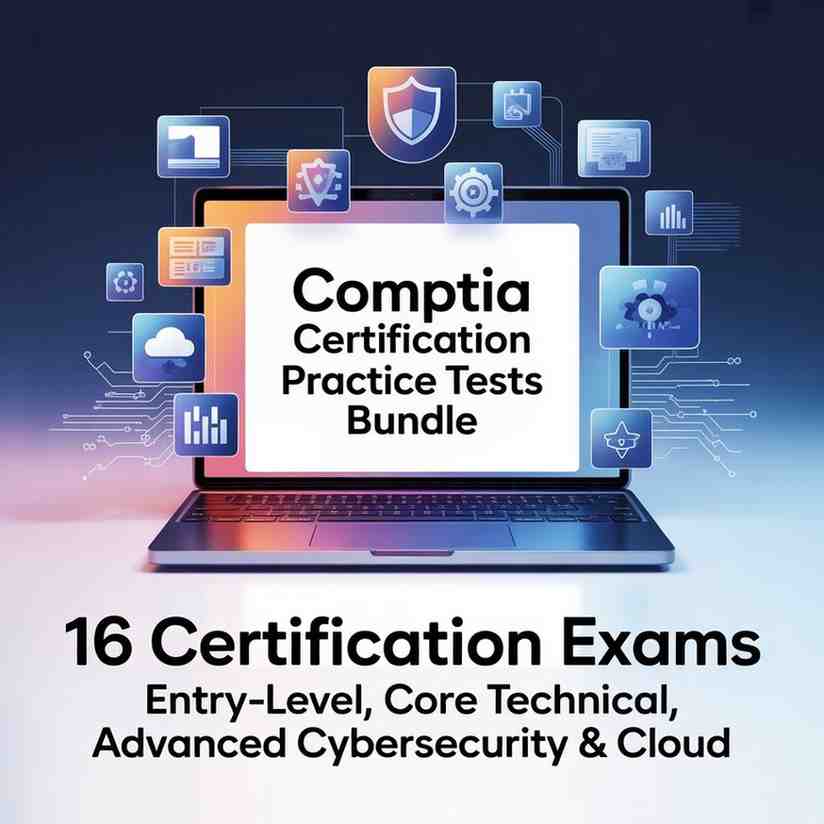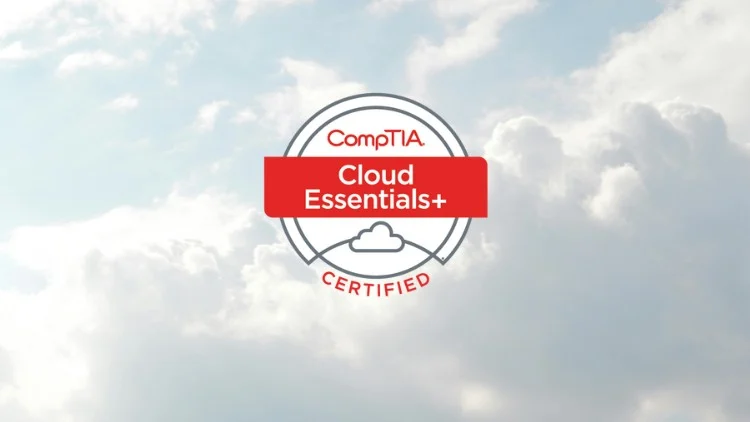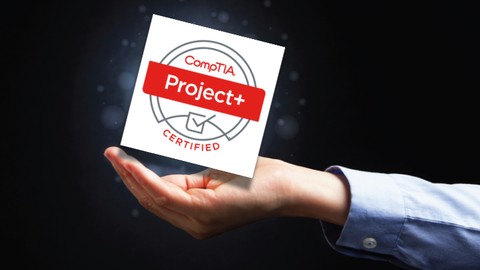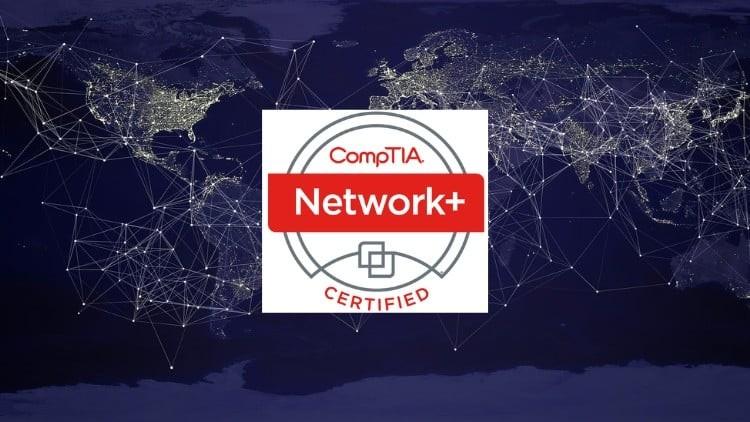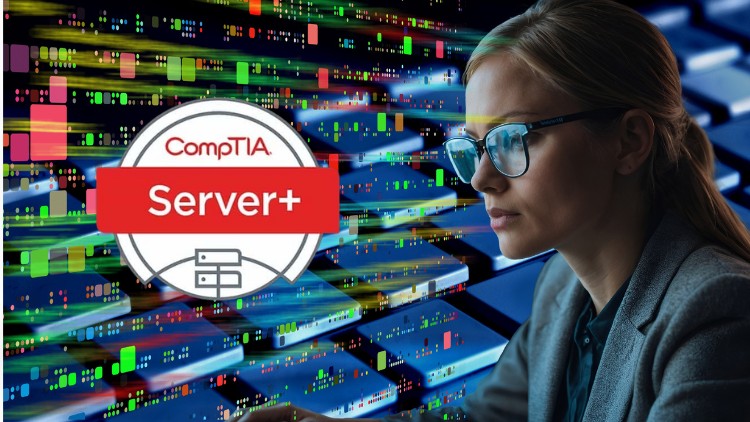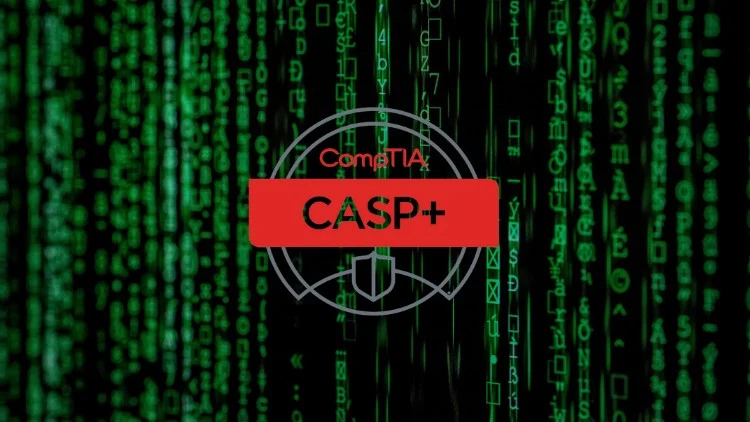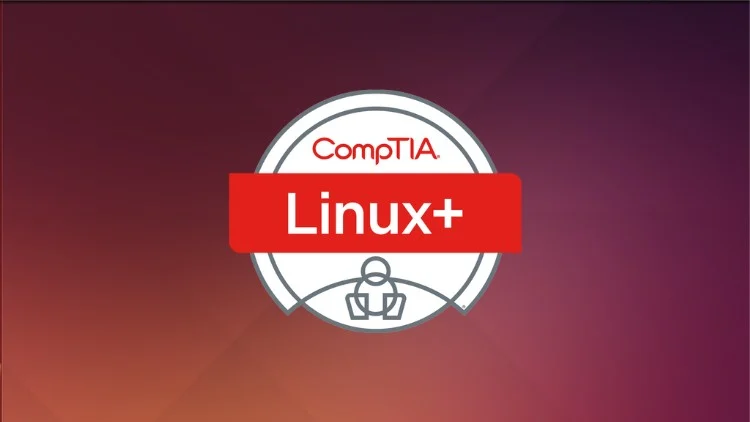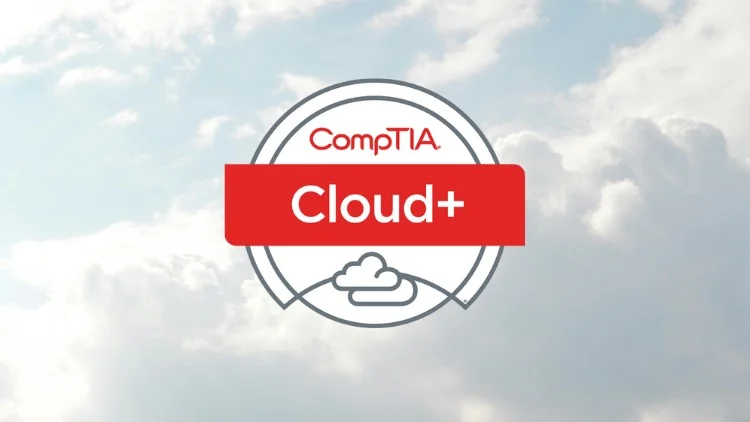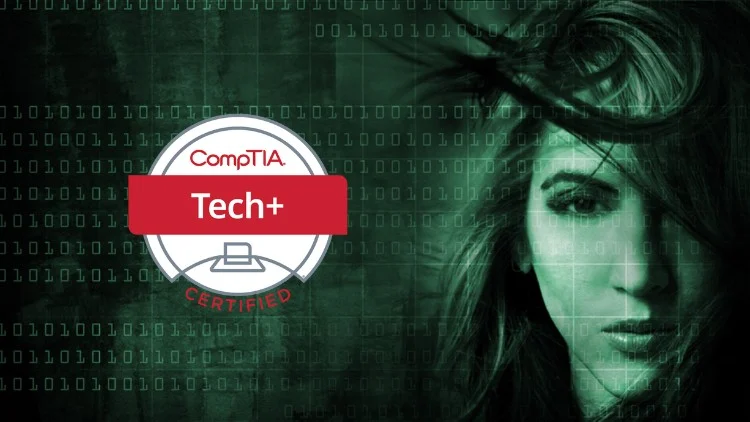Introduction
The IT landscape is vast and ever-evolving, making it challenging for professionals to navigate the optimal path for career growth. CompTIA Certifications offer a structured, vendor-neutral approach to developing and validating critical skills at every stage of your IT journey. Whether you’re a newcomer eager to learn the basics or an established professional seeking to specialize, creating a IT Certification Roadmap can help you go from beginner to expert in a systematic, goal-oriented way.
In this guide, we’ll explore why CompTIA stands out for career advancement, outline the certification hierarchy, and map your IT career using CompTIA Certifications for each stage of your IT journey to relevant credentials. By the end, you’ll know exactly how to leverage CompTIA’s suite of certifications—from ITF+ and A+ at the entry level to advanced options like CASP+, PenTest+, and CySA+—to achieve professional success.
Why CompTIA Certifications are Key to IT Career Growth
- Vendor-Neutral Approach:
Unlike proprietary certifications focused on single-product ecosystems, CompTIA covers fundamental IT concepts applicable across multiple platforms (Windows, Linux, cloud environments, etc.). This flexibility ensures you can adapt your skills to various roles and industries. - Industry Recognition:
CompTIA credentials are recognized globally. Employers often list certifications like A+ or Security+ as job prerequisites, knowing they validate a standardized level of competency. - Progressive Learning Path:
CompTIA’s certification tracks form a staircase: foundational credentials (e.g., A+) lead to mid-level certifications (Network+, Security+), culminating in advanced, specialization-specific certifications (CySA+, CASP+). This logical progression simplifies career planning. - Updated to Current Trends:
CompTIA regularly revises exam objectives to address shifting industry needs—cyber threats, cloud adoption, emerging technologies—ensuring you gain up-to-date, practical skills. - Better Salary and Career Opportunities:
Certified professionals often command higher salaries than their non-certified counterparts. Employer surveys indicate certifications can accelerate promotions and job stability.
Laying the Foundation: Entry-Level Certifications
1. CompTIA IT Fundamentals+ (ITF+)
Best For: Absolute beginners or individuals with minimal tech background.
Skills Focus: Basic computing concepts, hardware and software terminology, essential security practices, fundamental networking principles.
Career Impact: Clarifies if a tech path is right for you; serves as a stepping stone to A+.
Key Takeaways:
- Understand everyday computing and basic troubleshooting
- Explore general IT roles before committing to further certifications
2. CompTIA A+
Best For: Individuals aiming for entry-level IT support roles.
Skills Focus: Hardware installation, OS troubleshooting, virtualization basics, basic networking, and fundamental security concepts.
Career Impact: Regarded as the industry standard for help-desk and support technician roles; building block for advanced certs.
Key Takeaways:
- Gain confidence in practical, hands-on tasks like replacing components or configuring systems
- Qualify for roles such as help-desk tech or field service technician
Mid-Level Progression: Strengthening Core IT Skills
1. CompTIA Network+
Best For: Aspiring network administrators, system admins, or professionals wanting deeper networking knowledge.
Skills Focus: LAN/WAN design, routing protocols, device configuration, network security, virtualization, and cloud fundamentals.
Career Impact: Widely recognized for network-centric roles; frequently listed in job requirements for system and network admins.
Key Takeaways:
- Move beyond basic hardware/software support into comprehensive networking
- Perfect next step after A+ for those targeting infrastructure careers
- Boost your exam success with Gururo’s CompTIA Network+ Practice Tests—featuring real-world questions, detailed explanations, and full-length mock exams to ensure you’re fully prepared!
2. CompTIA Security+
Best For: Professionals looking to break into cybersecurity or enhance security-focused roles.
Skills Focus: Threat detection, cryptography, access controls, incident response, risk management, and network security fundamentals.
Career Impact: Often the first certification HR teams look for in security-related postings; can lead to security analyst or SOC roles.
Key Takeaways:
- Establish a broad, foundational security skill set
- Requirement for many DoD or government-related IT positions
- Boost your exam success with Gururo’s CompTIA Security+ Practice Tests, featuring realistic, exam-like questions and expert explanations.
3. CompTIA Linux+
Best For: Individuals aiming to specialize in Linux system administration.
Skills Focus: Command-line proficiency, file system hierarchy, security measures (SELinux, iptables), scripting, and process management.
Career Impact: Linux is prevalent in servers, cloud platforms, and DevOps environments. Linux+ can open doors to system admin or DevOps roles.
Key Takeaways:
- Mastering Linux is invaluable for cloud computing and cybersecurity
- Ideal supplement to Network+ or Security+ for a more robust skill set
- Boost your certification success with Gururo’s CompTIA Linux+ Practice Tests – realistic, high-quality mock exams designed to help you ace the test on your first attempt!
Advanced Specializations: Focusing on In-Demand Tech Roles
1. CompTIA Server+
Best For: Technicians managing enterprise server hardware and software.
Skills Focus: Server architecture, installation, upgrades, virtualization, storage, and disaster recovery.
Career Impact: Essential for data center roles or system admin duties focusing on servers.
Key Takeaways:
- Dive deeper into physical/virtual server nuances
- Pair with Cloud+ or Linux+ for a complete infrastructure skill set
- Boost your exam readiness with Gururo’s CompTIA Server+ Practice Tests — the ultimate tool to master exam topics and gain hands-on confidence!
2. CompTIA Cloud+
Best For: Professionals working with or transitioning to cloud-based systems and infrastructures.
Skills Focus: Cloud architecture, deployment, security, orchestration, and troubleshooting across multiple vendor environments.
Career Impact: Addresses rising cloud tech demand, paving the way to roles like cloud engineer or architect.
Key Takeaways:
- Understand multi-cloud, virtualization, and container technologies
- Natural progression from Network+ or Linux+, bridging to DevOps or advanced architecture roles
- Prepare with confidence using Gururo’s CompTIA Cloud+ Practice Tests – the most comprehensive exam simulator to help you pass on your first attempt!
3. CompTIA Cybersecurity Path (CySA+, PenTest+, CASP+)
CySA+ (Cybersecurity Analyst):
- Targets threat analysis, incident response, and behavior analytics.
- Suits SOC analysts or mid-level security professionals bridging the gap between Security+ and CASP+.
PenTest+ :
- Focuses on penetration testing, vulnerability assessments, ethical hacking methods.
- Ideal for ethical hackers, security engineers, or red-team members.
CASP+ (CompTIA Advanced Security Practitioner):
- Advanced-level certification covering enterprise security architecture, risk analysis, and high-level security integrations.
- Designed for senior security architects, consultants, and managerial roles requiring deep security acumen.
Key Takeaways:
- Path revolves around advanced threat management and offensive/defensive security
- Equips you to tackle specialized roles in cybersecurity, from ethical hacking to top-tier security planning
Comprehensive Roadmap: From Beginner to Expert
Stage 1: New to IT (ITF+ / A+)
- Learn Basic Concepts: Explore daily computing tasks, troubleshooting, simple networking.
- Potential Roles: Help-desk technician, tech support rep.
Stage 2: Building a Strong Core (Network+, Security+)
- Expand Your Skill Set: Acquire deeper networking knowledge, address security fundamentals.
- Potential Roles: Network admin, security specialist, junior systems admin.
Stage 3: Exploring Specializations
- Select a Path: Cloud (Cloud+), Linux (Linux+), Server management (Server+), or advanced security (CySA+, PenTest+).
- Potential Roles: Cloud admin, Linux engineer, data center technician, cybersecurity analyst.
Stage 4: Achieving Expert Status (CASP+ or Specialty Paths)
- Enterprise-Level Focus: Advanced security architecture or multi-cloud orchestration.
- Potential Roles: Senior security architect, DevOps lead, security consultant, solutions architect.
Note: This roadmap isn’t strictly linear—some professionals skip certain credentials based on their goals or experience. However, each stage builds upon fundamental skills gained from the previous levels.
Career Paths and Roles for Each Certification Tier
1. Entry-Level Roles
- Help Desk Technician (CompTIA A+):
- Resolve basic software/hardware issues, escalate major network concerns.
- Technical Support Associate (CompTIA ITF+ / A+):
- Offer assistance via phone or email, minor troubleshooting, OS reinstallation.
2. Intermediate Roles
- Systems Administrator (A+, Network+, Linux+):
- Maintain servers, networks, and user account management, applying security best practices.
- Network Specialist (Network+):
- Oversee network infrastructure, handle routing/switching, ensure connectivity.
3. Advanced and Expert Roles
- Security Engineer (Security+, CySA+):
- Identify vulnerabilities, implement security defenses, handle incident response.
- Penetration Tester / Ethical Hacker (PenTest+):
- Conduct penetration tests, analyze discovered vulnerabilities, deliver security improvements.
- Senior Security Architect (CASP+):
- Design overarching security frameworks for enterprises, manage compliance.
- Cloud Architect (Cloud+):
- Develop cloud strategies, manage multi-cloud solutions, optimize cost and performance.
How CompTIA Certifications Help in Career Advancement
- Immediate Professional: Credibility: Recruiters often filter resumes by certifications—CompTIA credentials can help you clear early screening stages.
- Stepping Stone to Higher: Salaries: Industry surveys consistently show that certified professionals command higher salary brackets than uncertified peers.
- Broader Networking: Opportunities: Many IT pros gather in CompTIA communities, opening doors to job referrals, peer recommendations, and co-learning.
- Skill Validation Across: Employers: Changing jobs or contracting? Your certifications remain relevant, establishing your skill level wherever you go.
Tips to Choose the Right Certification at Each Stage
- Assess Your Current Skill Level: If you’re completely new, start with ITF+ or A+. If you’ve handled networking tasks, skip directly to Network+ or Security+.
- Set Clear Goals: Want a job in cybersecurity? Prioritize Security+ or the Cybersecurity path (CySA+, PenTest+). Interested in servers? Look at Linux+, Server+, or Cloud+.
- Consult Job Descriptions: Identify which certifications local employers or your dream companies list in job posts.
- Leverage Study and Lab Tools: Practical experience (home labs, virtual machines) complements textbook learning.
- Stay Current: CompTIA releases updated exam versions periodically. Always study from the latest materials to match current exam objectives.
Conclusion
CompTIA Certifications offer a comprehensive, vendor-neutral IT certification roadmap that can guide your transition from beginner to expert in the tech world. Starting with ITF+ or A+ ensures you build a solid foundation, while Network+ and Security+ sharpen your intermediate skills. From there, specialized credentials in cloud, security, or servers enable advanced roles and higher salaries.
By choosing the right certification path, staying abreast of industry trends, and consistently building hands-on experience, you’ll be well-positioned to excel in today’s dynamic IT arena. Whether your dream is to become a cybersecurity analyst, cloud engineer, or IT manager, CompTIA helps you master the competencies employers demand—and empower your career growth every step of the way.
Disclaimer: Always verify the most current exam details, objectives, and requirements on the official CompTIA website to ensure you prepare effectively for updated certification versions.
FAQs
What are the best CompTIA certifications for starting an IT career?
A+ is the industry standard for entry-level. If you’re entirely new to IT, ITF+ can ease you in.
How do CompTIA certifications help in career advancement?
They validate recognized skill sets, ensuring employers see proven technical knowledge; often tie into promotions and salary bumps
What is the career path for CompTIA A+ certified professionals?
You can move into roles like help-desk support, junior systems admin, or proceed to Network+ and Security+ to open more specialized roles.
How can I transition from beginner to expert in IT with CompTIA?
Follow a structured progression: A+ → Network+/Security+ → Specialized certs (e.g., Cloud+, CySA+, CASP+). Gain hands-on experience at each level
What roles can I pursue after earning CompTIA certifications?
Depends on the certification. A+ leads to support roles; Network+ and Security+ can lead to sysadmin or security analyst jobs; advanced certs open doors to higher-tier positions like security architect or cloud engineer

